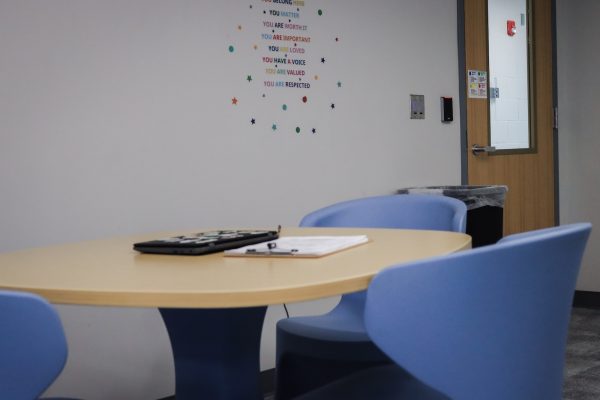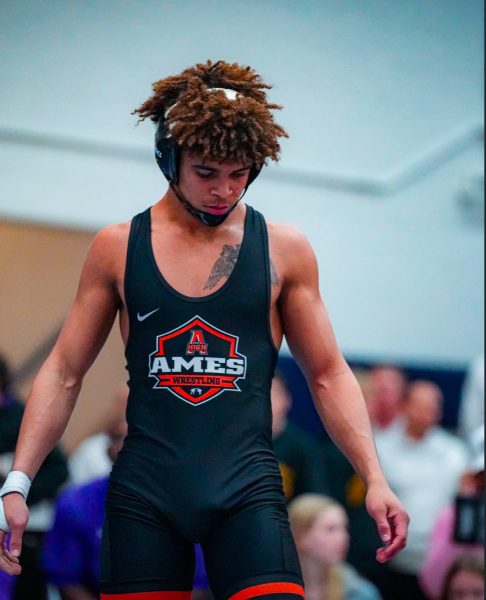Improve our sex ed
I have a confession to make: I still giggle when I talk about sex. Despite being a student in numerous reproduction units, taking Health at AHS, and participating in the Our Whole Lives program at my church, I still can’t talk about reproduction or relationships with a straight face. I’m not alone; many of my peers struggle to say certain words without breaking into nervous laughter. However, reproduction is as simple as human biology and relationships, whether sexual or otherwise, are something every person experiences during their lifetime. Clearly something is lacking in our education system if students are unable to talk about a nearly universal human experience.
Certainly people can have their own opinions on whether or not students should be taught about sex and contraception in public schools. However, sexuality is already required to be taught in Iowa public schools according to Iowa Code. This isn’t the issue. We should make sure that, if public schools are required to teach sex ed, all information should be factual and relevant.
Iowa Code requires that “each school board shall provide age-appropriate and research-based instruction in human growth and development.” It’s left up to the school board to decide what is age-appropriate, though all information used must be “medically accurate and objective by leading professional organizations and agencies with relevant expertise in the field.”
Ames schools teach basic reproduction starting in elementary school and middle school, but the real anatomy lessons come in the form of AP Bio or Biology during sophomore year. The reproduction unit in these courses teaches basic anatomy but does not give students the detailed information on relationships, values, and contraception that other courses might.
Health class is a course that students typically take during their sophomore year. Many students receive exemptions from the course for various reasons, such as religious beliefs that do not permit the student to attend the class.
Parents who keep their children out of health classes (and don’t educate them at home) are not preventing their children from learning about sex. Instead, they’re ensuring that the students will not receive factual information. High school is full of rumors about sex, some of them potentially harmful.
“We wouldn’t allow it if a parent decided ‘I want my child to opt out of math,’” said Andrew Williams, co-facilitator of the Our Whole Lives program at the Unitarian Universalist Fellowship of Ames, a value-based curriculum that teaches anatomy and development, healthy relationships, and decision-making.
Students who believe in abstinence until marriage should never have to compromise their beliefs in a sex ed class. Good health education should never force beliefs on students, but rather present them with information and the decision-making skills to make the right choice in any situation. We, as a community, should make sure that our required Health class teaches up-to-date, factual information about healthy relationships and sex.
During the relationships unit in Health class, students are required to teach the class about a birth control method that is assigned to them. My assigned method was withdrawal (alternately called “pulling out”). I was handed a sign that read “when in doubt, pull out,” and instructed to teach the class about a method that I knew is typically unreliable for teenagers.
Planned Parenthood explains that “[Withdrawal] requires great self-control, experience, and trust, is not for men who ejaculate prematurely, is not for men who don’t know when to pull out, and is not recommended for teens and sexually inexperienced men because it takes lots of experience before a man can be sure to know when he’s going to ejaculate.”
Public schools should make sure that all information given to students is correct and gives the whole picture, including explanations rather than statistics without context for interpretation. This doesn’t mean teaching students what to believe or disrespecting students’ religious convictions. However, we must also remember that public education must teach about all people, not just the accepted “norm.” Our Health curriculum covers healthy relationships, self esteem, and safe sex, but rarely, if ever, relates these to LGBT teens.
“There’s not room for judgment for sexual orientation or gender in public school,” said Lori Allen, co-facilitator of OWL. “Whether you think it’s right or wrong, you have people who identify as bisexual, gay, straight, transgender, or questioning. It’s important that, in a public setting, you welcome people who identify in any of those ways, and also embrace them for being who they are. When people feel like their way of being may not be acceptable, it trickles into all other areas of their life.”
For students who are curious about sexual orientation or gender issues, the AHS club Spectrum offers information and discussion on issues that affect the LGBT community. This doesn’t- and shouldn’t- replace accurate, unbiased information given in a health curriculum, but it’s a start.
Sex education should give students a welcoming environment in which information isn’t viewed as dirty or taboo. Knowledge is empowering.
“A lot of people have intimate relationships without having sexual relations at all, some have intimate relationships with having intercourse, and some find other ways of finding sexual gratification without intercourse,” Allen said. “What we’re saying is, you should be in a relationship where both people are respected, that consent needs to be given by both parties before anything sexual happens, and that only you get to decide when you’re ready, thinking about consequences like unplanned pregnancy or breaking up. You are the only one who can say ‘yes, I’m ready.’”
“It’s in the control of the individual, rather than what parents or peer pressure say,” Williams said. “It’s informed consent and it’s empowering.”
Ames High is a community of high-achieving students and great teachers. I’m positive that with a little work, our health education classes can be made even better, creating a more welcoming place for all students and giving them the power to make their own healthy decisions.
Your donation will support the student journalists of Ames High School, and Iowa needs student journalists. Your contribution will allow us to cover our annual website hosting costs.

As her title would suggest, Opinion Editor Lauren Gentile has many opinions, some of them even worth listening to. Lauren enjoys winning Mario Kart battles,...





























Kim Burnett • May 21, 2014 at 11:22 am
Hi Lauren, I’m glad you chose to write about sex ed in the WEB. As a sex ed teacher for 30 years I have had the chance to inform thousands of students. Because teaching about these topics is so sensitive I am always very careful and I ALWAYS use accurate up-to-date science based information. To clarify what you wrote about “teaching” about a birth control method that is NOT what you did – you did a 2 minute commercial to PROMOTE the method which is very different than teaching it. To correct your assumption and Planned Parenthood’s information – which I respect – here is the source I used:
Withdrawal as an effective method of birth control is from the FLASH Family Life and Sexual Health Curriculum from Seattle and King County; revised in 2011. I used lesson 10, this is addressed on page 7. The following information was also given to the students who were assigned to promote withdrawal: (Maybe you forgot that I gave each group materials to use.)
“Why include withdrawal? Despite the physical challenges inherent in using withdrawal effectively, we include it because: withdrawal is more effective than previously thought and withdrawal is common among teens, free and always available. Research studies show that pre-ejaculate (fluid from the Cowper’s glands) does not contain sperm, in contrast to previous assumptions.15 In fact, when withdrawal is used correctly, experts calculate that only four percent of couples are likely to get pregnant in a year. Taking typical human error into account, 27% would get pregnant, which is comparable to the diaphragm, sponge and other spermicides.16 In contrast, over three times as many couples (85%) would get pregnant using no method for a year, making withdrawal significantly more effective than using nothing. It should also be noted that withdrawal reduces the risk of sexually transmitted diseases (STD) and the human immunodeficiency virus (HIV) by about half 17, which is better than most other methods of birth control, excluding condoms.”
15 Hatcher, R.A. et.al. (2007). Contraceptive technology: Nineteenth revised edition. New York, NY: Ardent Media.
16 Hatcher, R.A. et.al. (2007).
17 Hatcher, R.A. et.al. (2007).
I hope this information helps clear up any confusion your readers may have. I’d love to talk to you – in person – about these issues because Ames Schools certainly could devote more time and resources to teaching about sex! I believe students deserve to be well-informed so they can made the healthiest life-changing decisions.